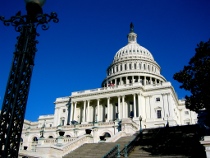Obama’s climate bill losing support
Proposed energy reform stalls in the US Senate - EU worries an international climate change agreement will not be possible.

 The proposed energy reform bill continues to stall in the US Senate. European governments worry that if the bill does not pass in the United States, an international climate change treaty will be impossible to achieve during Mexico City's COP16 summit set to occur this summer.
The proposed energy reform bill continues to stall in the US Senate. European governments worry that if the bill does not pass in the United States, an international climate change treaty will be impossible to achieve during Mexico City's COP16 summit set to occur this summer.
Support, already waning on the bill, has taken another blow as three major companies withdrew from the US Climate Action Partnership (USCAP), which is a leading environmental-business coalition lobbying for the bill to pass.
The companies that withdrew include BP, CLP and ConocoPhillips.
Their major concern was that bill had become less focused on implementing quality reforms, and more focused on pushing any legislation through. ConocoPhillips and BP spokesmen Red Cavaney, as quoted by the Wall Street Journal said:
"USCAP was starting to do more and more on trying to get a bill out without trying to work as much on the substance of it."
Over 20 large companies remain in the USCAP coalition. However, this move may indicate a changing of climate change politics in Washington, which at the start of the Obama presidency appeared to be full of promise, especially when the House narrowly passed the cap-and-trade measure last summer.
Politics are a huge factor in the bill's declining support. Because the bill comes in lieu of a major Congressional election and Republicans are expected to gain seats, the possibility of strong climate legislation with penalties for uncooperative companies is no longer inevitable.
The result is that companies are less likely to cross the line, and more likely to preserve self-interests than work with the government and across industries.
But news is not all bad for climate change activists. Even if Congress fails to pass legislation, the Executive branch promises to exercise the authority it has, which is powerful in its own right-as of 2007, the Supreme Court granted the EPA the authority to regulate CO2 emissions.
Obama and EPA head Lisa Johnson will use the EPA's powers to curb carbon emissions if the Senate fails to pass the climate bill, although they prefer Congress take the lead. In addition, it is possible that if Obama's proposed nuclear renaissance succeeds, more Republicans might be willing to cross party lines for the climate bill.
In addition, private industries have typically led the way in climate innovation whereas political change has lagged. And, regardless of the United States' energy policy, the EU must pursue its own innovative energy policies-waiting for the US to pass a bill, will cause the EU to fall behind the global green economy, which is set to take off regardless.
Michael Good | Climate Action
Image Provided by: Elliott P. | Flickr




